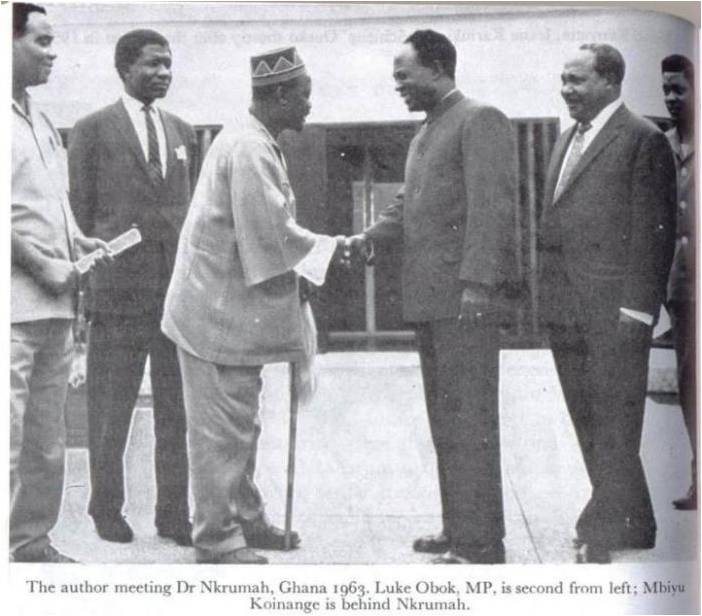The influence of Ghana on the decolonisation of the rest of Africa.

Under the
leadership of Nkrumah, Ghana played a significant role in the decolonisation
process in Africa.
Inspiration
The independence of Ghana on 5th March 1957 inspired other African colonies to demand for their independence. It brought a new wind of change to blow "" across Africa. Just as Ghana had obtained self-rule, even other British African colonies wanted the same. They therefore pressurised Britain to grant them self-rule. Hence the independence of Tanganyika and Sierra Leone in 1961, Uganda in 1962, Kenya and Zanzibar in 1963, Gambia in 1965 etc.

Ghana provided proper guidance to other African countries still struggling for independence. Before, during and after independence, Nkrumah declared that the independence of Ghana alone would be meaningless if the rest of Africa remained under colonial rule. He therefore vowed to use all resources at his disposal to fight for Africa's independence. He moved to many African countries providing guidance to the nationalists. Nkrumah declared the 20th Century as a century for Africa and the 1960s as a decade of decolonisation. This made nationalists to fight hard and obtain self-rule before the end of the Century.

A
lesson to endure sufferings: Other African
nationalists came to learn that independence could not be obtained on a silver
plate. They learnt of the imprisonment and torture of J.B. Danquah, Kwame
Nkrumah and other nationalists in Gold Coast. They learnt about the killings of
peaceful demonstrators in 1-948 etc. Such experiences made nationalists in
other African countries to endure suffering for example in Uganda, South
Africa, Angola etc.
Ghana as a base of Pan-Africanism; Soon after independence, Nkrumah organised Pan African congresses in Accra. The first congress of independent stales was in April 1958, followed by the December 1958 congress for all African states- whether or not independent.

These became breeding grounds for
nationalistic ideas and strategies for independence. Participants like Patrice
Lumumba of Congo, Tom Mboya of Kenya and Roberto Holden of Angola spearheaded
the struggles for independence in their home countries.
It became a propaganda base for African nationalists. This was because a number of African nationalists used Radio Accra to spread anti-colonial propaganda. They condemned the colonial oppression and exploitation and called upon the masses to unite against the colonial masters.

African
States adopted Ghandism or positive action as a method of fighting for
independence. This was because it had proved successful in Ghana. Hence
strikes, boycotts, protests and demonstrations became rampant in Uganda,
Nigeria, Zambia, and South Africa etc.
Ghana
extended financial help to nationalists in various parts of Africa, for example
Malawi, Belgium Congo, South Africa , Angola and Guinea. The abrupt French
withdrawal from Guinea and their destruction of property and refusal to extend
economic aid to the country had threatened to demean Guinea's independence.
This made Nkrumah to extend a Ghanaian loan of £ 4,500,000 to Guinea for
economic reconstruction.
Formation
of political parties; Ghana called upon all African
nationalists to organise themselves into political parties or liberation
movements. Hence Tom Mboya of Kenya formed the Convention Party to fight for
Kenya's self-rule. Its name was close to Nkrumah's Convention Peoples' Party,
Ghana advocated for African Unity: In 1958, it initiated the Ghana -Guinea Union and described it as the nucleus of a United States of Africa. It was later joined by Mali and the three presidents - Nkrumah, Sekou Toure and Modibo Keita started disetissing the prospects of African Unity and extended support to liberation movements in other African countries.

It
provided a training base for the guerrillas of the ANC, MPLA, ZANU, ZAPU, SWAPO
and FRELIMO. Most of these were given academic and military training in Ghana,
were issued with Ghanaian passports and identity cards etc.
It
reconciled nationalists who had developed conflicts. These included individuals
like Lumumba against Kasavubu in Congo and parties like the ZANU against the
ZAPU in Zimbabwe.
Ghana
influenced the UNO to speed up the decolonisation of Africa. Nkrumah did this
by exposing the atrocities of colonialists in Africa for example in 1960, he
described the situation in Algeria as pathetic and won the UNO's sympathy for
the Algerians. He also, criticised the Portuguese brutality in Africa. This
made the UNO to pressurize both France and Portugal to decolonise.
Ghana
condemned secessionism in Africa. For example it condemned the 1960 - 64
Katanga secessionist movement and even dispatched troops to assist Lumumba
against the secessionists,
Ghana
called for African Unity. As a strong Pan African state,
Ghana was unhappy with the divisions between the radical Casablanca
nationalists and the moderate Monrovia group. Nkrumah worked hard to convince
both groups to dissolve their differences. The effect of this was the formation
of the Organisation of African Unity (OAU) in l963.
Ghana's non-alignment ideology was quickly adopted by other African states in relation to superpower politics.

National Movements and New States in Africa